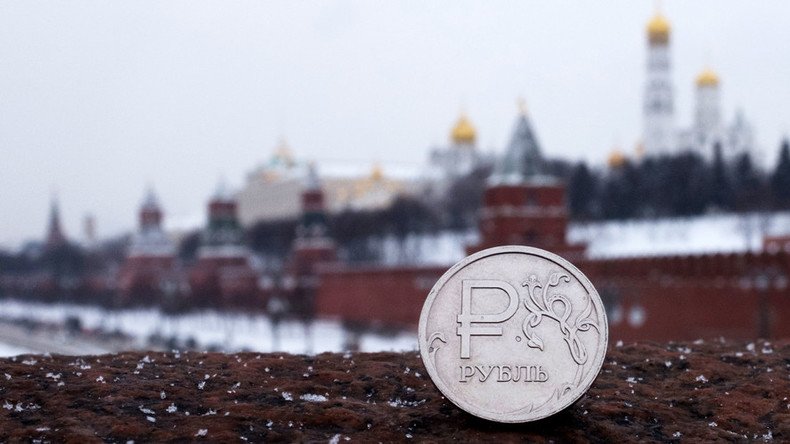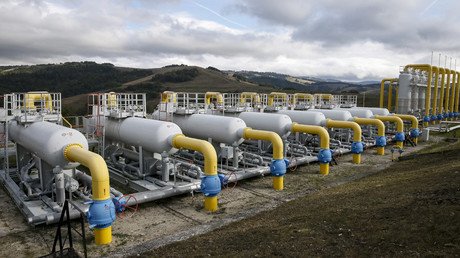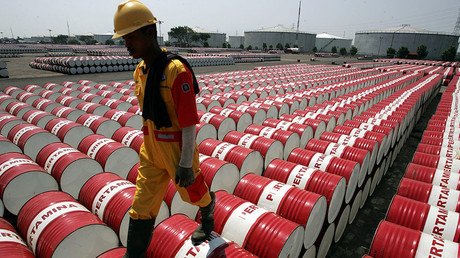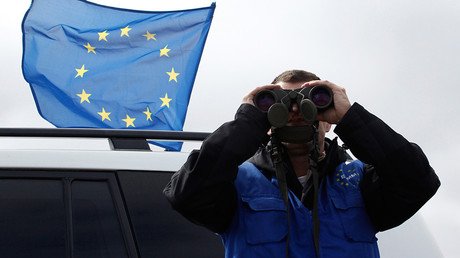Russia grappling with new economic realities

As the world's media attention is currently fixed on the conflict in Syria, and to a lesser extent Ukraine, there has been an ongoing economic conflict occurring against Russia.
Economic sanctions against Russia have turned out to be a double edged sword, hurting European exporters and manufacturers as much as Russian importers and consumers. Last year the situation got so bad that the Polish national railways, PKP, was handing out apples to its passengers in bid to get rid of a huge surplus piling up in warehouses that would normally be exported to Russia.
Another more serious aspect of the economic conflict is the prospect of US liquefied natural gas (LNG) exports replacing Russia's traditional markets in the EU and beyond. The stunning increase of fracked gas in the US has made the price of natural gas the lowest in 17 years, thus making exports the only viable option of getting higher price.
Just last week the first major LNG shipment left the Gulf Coast's newly completed export terminal in Louisiana for overseas markets. This created a new reality on the ground as far as US gaining status of gas exporter. According to a report in the Wall Street Journal, the attempt to take the market from Russian energy giant Gazprom has begun.
However the new energy reality emerging on the ground in the EU goes along with deeper geopolitical aims that have very little to do with long term benefits for European consumers. In the fall of 2014 edition of Foreign Affairs magazine, John Mearsheimer of University of Chicago spelled out the causes of US current involvement in Ukraine and its possible repercussions.
The geopolitical game aims at isolating Russia from its richest and most important export market by creating a shift in dependency of the EU's marketplace. Naturally all Russian energy companies with their existing infrastructure have capacity to compete in the global marketplace on both price and quality so the instability in Ukraine is used as pressure point to switch the supply line from Russia to other, preferably US sources.
In Ukraine itself, the son of the US Vice-President Joe Biden, Hunter Biden is on the board of the country's hydrocarbon company, Burisma Holdings. Just before his appointment to the board in May of 2014, Biden traveled to Kiev on April 22, 2014 and urged the Ukraine government “... to reduce its dependence on Russia for supplies of natural gas."
The Burisma board also includes ex-President of Poland, Aleksander Kwasniewski giving the company image of geopolitical player that doesn't shy away from appearance of conflicts of interest at the highest places.
The conflict escalation is taking the more strategic economic route in hurting the majority of established gas exporting countries. The US exports face a crowded market as they will have to compete with a non-fracked gas from Russia, Norway, Australia and the UK, not counting numerous Eastern European fracking producers.
This will also hurt the traditional coal-based energy markets such as Poland where the coal industry demise will cause significant problems for the ruling right wing PiS government, a staunch ally of the US.
On the fracking front both Bulgarian and Romanian governments have attacked anti-fracking activists in a vicious smear campaign supported by parallel effort by then NATO's chief Anders Fogh Rasmussen. This was done in concert with extensive and expensive global PR campaign on behalf of frackers that portrayed activists as Putin's agents and accused them of receiving financial support from Moscow without any conclusive evidence presented to support their allegations.
'Oil market passed the worst point’: Signs of recovery seen for 1st time in 20 months https://t.co/LujwXxJJ4upic.twitter.com/fVGbYKoJWP
— RT (@RT_com) March 1, 2016
As 2014 comes to a close the American mainstream media has represented the most aggressive attack on global environmental movements that defend peoples’ right to...
Ironically, the loudest accusations of corruption by Russian money came from Romanian PM Victor Ponta that himself was removed from office and indicted on corruption just last year.
The increase of export capacity as panacea to fight low prices here in the US has got the industry thinking strategically and long term. Due to enormous popular opposition to fracking resulting in many local moratoriums and state-wide bans on it, the frackers have gotten bold in their effort to change public perception.
In Colorado the state's biggest player, Anadarko Petroleum has resorted to sending its employees, geologists and engineers to Rotary Clubs, PTA groups and high schools in an effort to present fracking as an environmentally neutral activity despite documented evidence on the contrary. This propaganda push in addition to $11.8 million spent by oil companies to lobby Congress in 2014 alone had a truly grotesque Soviet-like tint to it as well. For example, the Anadarko's representatives such as Rebecca Johnson have visited Windsor, CO high school and gave a presentation that was supposed to alleviate fear of the community in a classic style of propaganda show exposed in the movie "Gasland."
However what was different this time was the audience. The company decided to reach out to children so they could in turn "convince" their parents on merits of fracking. The idea was to create "local ambassadors" of Anadarko so they can help avoid more protracted conflict the community has experienced thus far.
When I contacted the school about merits and methodology of the presentation I was told by the school principal Michelle Scallon that the event followed closely the policy set up by the district's school board to present any issue such as this in a balanced and fair way.
Since fracking process uses proprietary chemicals and formulas I received no answer on what actually has been used in form of demonstration other that the kids wore protective gloves and goggles eliminating any chance for injury. However the injury to public opinion has been already made as the presentation did not include a dissenting view from someone other than Andarko and any info on environmental cost that the community such as Windsor will have to bear for generations to come.
As a parting shot I was assured that fracking is a part of the community due to the economic lifeline it provides, i.e. Windsor is a business friendly environment regardless of costs associated with it. This insidious style of propaganda masquerading as science is not only deceptive but it also puts family and community members against each other in a classic divide and rule tactics of information manipulation. It is also highly questionable of educational priorities of the district when it opens its doors wide open to the corporate "medicine show" such as this.
The new gas war has characteristics of a zero-sum game where the only winner left standing will be the one that can "disrupt" the current supply base while outsourcing the externalities such as public health and environmental degradation to the public which will be left holding the bag, eventually.
In its geopolitical aspect it is also used to contain Russia and reduce it to the status of chaos it experienced in the 1990s under Yeltsin following the break up of the Soviet Union. Unfortunately for the US and its allies time doesn't go backwards and the marketplace of tomorrow will not bend to the unnatural block scenario envisioned by both the TPP and the TTIP.
As the largest geopolitical project since the WW 2, the EU is teetering on the brink of collapse, all market players in the energy sector might want to re-think what they really wish for.
The statements, views and opinions expressed in this column are solely those of the author and do not necessarily represent those of RT.
















